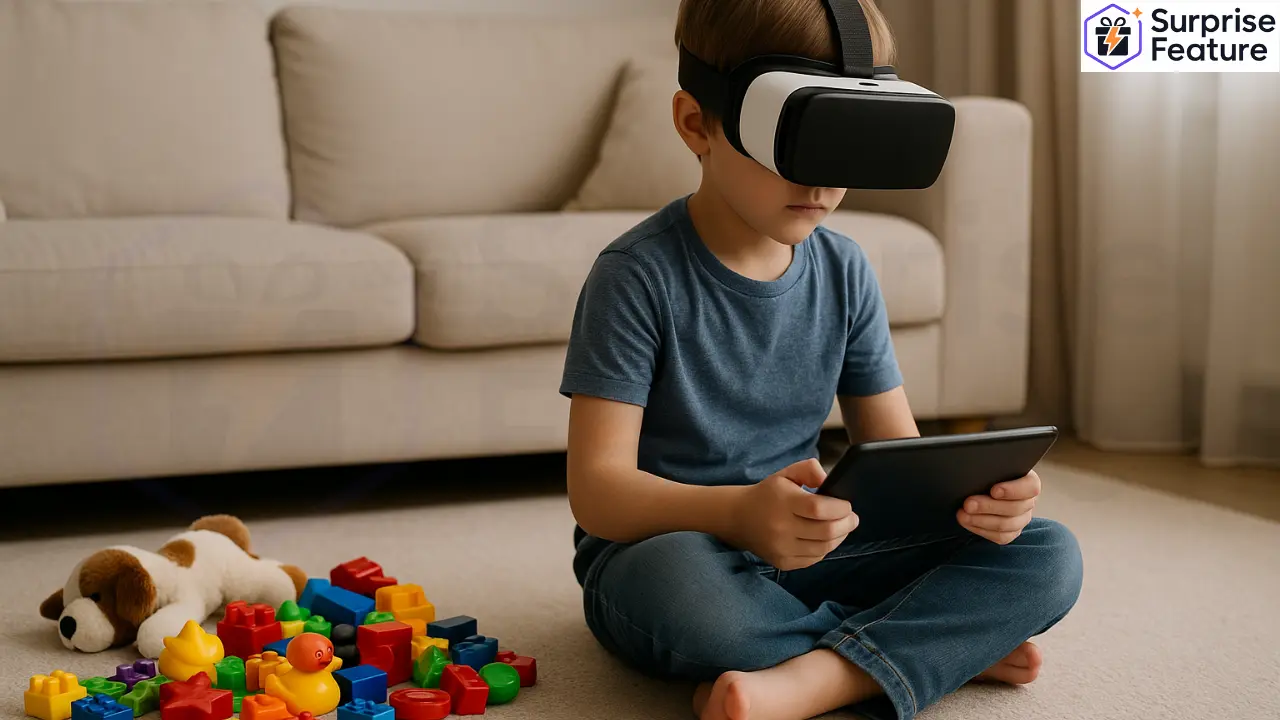Why Gen Alpha Kids Don’t Want Toys Anymore And What They’re Asking Parents Instead

Introduction: A Generation That Redefines Play
Childhood has always been closely tied to toys. From handmade wooden figures to battery-operated cars, every generation had its “toy story.” But as we step into 2025, the global parenting conversation is changing dramatically. Gen Alpha, the youngest generation born between 2010 and 2025, is the first to grow up completely in the digital era. These children are not just digital natives — they are digital-first humans. Their relationship with play, imagination, and entertainment is shifting in ways that surprise both parents and the billion-dollar toy industry.
Parents across continents report the same observation: when asked what they want for birthdays or holidays, many Gen Alpha kids no longer ask for dolls, trucks, or board games. Instead, they request tablets, subscriptions to gaming platforms, wearable gadgets, and even experiences such as concerts, travel, or coding workshops. This article explores why this generational pivot is happening, what kids are asking for instead, and what it means for industries and parents alike.
The End of the Toy Era?
For decades, childhood was inseparable from toys. Generations X and Millennials grew up with Barbies, Hot Wheels, Lego sets, and board games. Gen Z experienced both physical and digital toys — from Nerf blasters to PlayStations. But Gen Alpha’s toy box looks very different. Traditional toys now compete against immersive, screen-based entertainment and AI-powered learning tools. For many, plastic figures seem outdated compared to augmented reality games or interactive coding kits.
The global toy market, once seen as recession-proof, is under pressure. While still valued at over $120 billion, industry reports show that growth has slowed, and product lines increasingly need tech integration to stay relevant. What we’re witnessing is not just a decline in toy sales but a transformation of childhood itself.
What’s Driving the Shift
1. Technology at Their Fingertips
Unlike previous generations who gradually adapted to technology, Gen Alpha has never known a world without it. Many toddlers first interact with tablets before learning to hold crayons. By primary school, children are using Chromebooks or iPads in classrooms. By age ten, coding platforms, VR headsets, and AI-powered apps are familiar parts of daily life.
This immersion changes how they perceive toys. Why settle for a static action figure when a virtual game allows for endless customization, interaction, and community play? For these kids, technology isn’t a luxury; it’s the natural default. According to a BBC parenting report, 70% of parents surveyed admitted their children preferred digital games over physical toys.
2. Social Media Influence
Social platforms, especially TikTok, Instagram Reels, and YouTube Shorts, have become cultural playrooms. Children not only consume entertainment but also watch influencers reviewing products. A toy car commercial cannot compete with a YouTuber unboxing the latest VR headset or a gamer live-streaming an interactive world. Influencer culture has shifted demand from “things you own” to “tools you use to create.”
This is why requests for cameras, ring lights, microphones, and editing software are rising among kids under 12. They see peers or slightly older role models building content and want to emulate them. Toys are tangible but limited; content tools promise fame, expression, and digital community.
3. The Shift Toward Experiences
Another surprising shift is the value placed on experiences. Parents worldwide report children asking for theme park passes, coding workshops, art classes, or even airplane tickets instead of toy cars or dolls. This reflects two deeper trends:
- Parents themselves prioritize experiences over possessions — vacations, concerts, and wellness retreats are status symbols in today’s culture.
- Children exposed to this value system absorb the idea that experiences create lasting joy, while objects quickly lose novelty.
This generational change means “play” is no longer about stacking blocks but about exploring skills, creativity, and memories.
4. Educational Pressure
Gen Alpha children are also growing up under intense academic and social competition. Parents increasingly see childhood as preparation for an uncertain future shaped by automation and AI. As a result, “toys” that blend fun with learning — coding kits, science experiments, language-learning apps — gain parental approval. Kids, absorbing these cues, begin to ask for tools that enhance skills rather than toys that only entertain.
What They’re Asking Parents Instead
The birthday wish lists of Gen Alpha kids reveal a fascinating shift. Here’s what they’re choosing instead of dolls and trucks:
- Smartphones, tablets, and smartwatches that connect them to the digital world.
- Subscriptions to gaming ecosystems like Roblox, Minecraft Realms, and streaming platforms.
- AI-powered learning companions — from chat-based tutors to interactive robots.
- Concert tickets, virtual meet-and-greets, or travel experiences with families.
- Content creation kits, including cameras, ring lights, and editing software.
The Impact on the Toy Industry
This cultural revolution directly impacts the toy industry. Global giants like Lego, Mattel, and Hasbro are already rethinking their products. Lego, for instance, invests heavily in coding kits and app-connected building sets. Mattel is experimenting with AI dolls that respond to voice prompts. Even Barbie, once a symbol of traditional play, now comes with digital features and augmented reality integrations.
Yet challenges remain. Traditional toys are symbolic of childhood in most cultures. They nurture imagination, physical coordination, and social play. As digital replacements dominate, experts warn about the risk of losing tactile creativity. Industry insiders predict hybrid products — combining physical elements with digital interactivity — will define the next decade of play.
What This Means for Parents
For parents, this shift is a balancing act. On one hand, they want their children to embrace technology, develop skills, and stay relevant in a digital-first world. On the other hand, they fear the consequences of excessive screen time: reduced attention span, sedentary habits, and shallow social interactions.
Key parenting challenges include:
- Regulating screen time without stifling creativity.
- Encouraging outdoor activities to balance digital play.
- Teaching children financial responsibility as digital wish lists grow more expensive.
- Ensuring emotional development through family bonding and offline hobbies.
Experts recommend setting “tech boundaries” where gadgets coexist with traditional games, outdoor sports, and family rituals. Parents are also advised to engage in co-learning — participating in coding games, VR experiences, or content creation alongside children, ensuring digital activities foster collaboration rather than isolation.
Psychological Angle: Why Kids Reject Toys
From a psychological perspective, Gen Alpha’s toy rejection is not just about technology but identity. Children increasingly see toys as “babyish.” Digital tools, in contrast, give them a sense of maturity, independence, and relevance. The ability to connect online, stream media, and create content allows them to participate in a culture far bigger than their immediate circle.
Developmental experts highlight another factor: instant gratification. Traditional toys require imagination and patience — building a Lego castle, for example, takes time. Digital platforms provide immediate feedback, endless upgrades, and instant social validation. For a generation accustomed to speed, toys feel slow.
Global Variations in the Trend
Interestingly, the toy-to-tech shift is not uniform worldwide. In high-income countries like the U.S., Japan, and parts of Europe, children are leading the charge toward digital-first wish lists. In developing regions, however, traditional toys remain important due to affordability and cultural values. That said, as smartphones and internet penetration grow, even middle-income families in India, Brazil, and Africa report similar shifts in urban centers.
Case Studies and Parent Voices
These examples highlight the universality of the trend: play is no longer about imitation but participation in digital culture.
Looking Ahead: The Future of Play
The definition of play is undergoing a permanent transformation. As Gen Alpha grows older, the line between toys, technology, and learning will blur further. The toy industry may never fully disappear, but it will continue evolving into an experience-driven, tech-integrated ecosystem.
Analysts predict the rise of AI-curated play, where smart companions design activities based on a child’s mood, progress, and learning goals. Augmented reality toys will also play a key role, merging tactile play with digital layers. By 2030, a child’s toy chest may look more like a tech lab than a shelf of dolls and trucks.
For parents, the challenge is to balance nostalgia with practicality, ensuring their children enjoy both the creativity of toys and the opportunities of technology. What’s clear is that Gen Alpha has already redefined what childhood looks like — and industries, educators, and families must keep up.
